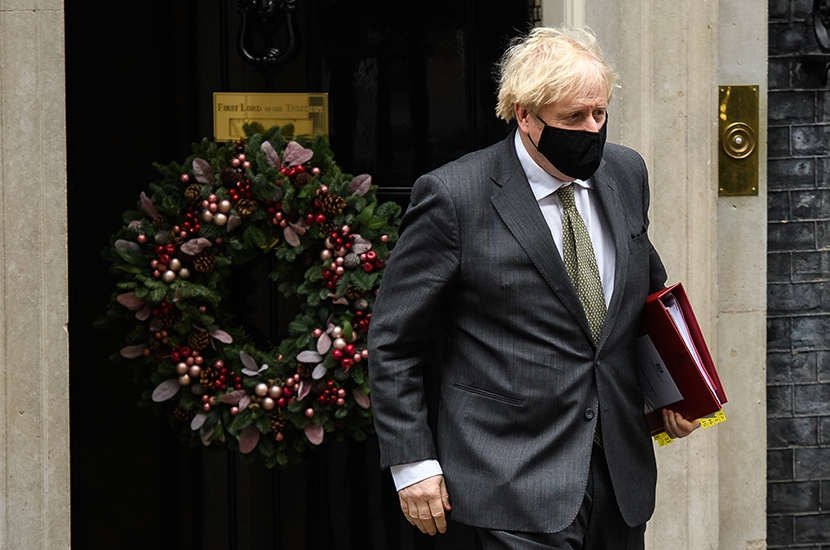When a deadline is missed for Brexit negotiations, it is tempting to think there will be another chance to keep talks going. Last week, the UK and the EU agreed that things needed to be wrapped up by Sunday night or Monday afternoon at the latest. The thinking was that if a deal was not done by then, the return of the Internal Market Bill to the Commons would scupper negotiations. But Monday afternoon passed with no agreement. The two sides now admit that the only real deadline is the end of the transition period on December 31.
The talks are currently in a state of suspended animation. After nine months, the sticking points are the same three issues: the so-called level playing field, fish and governance. Boris Johnson and Ursula von der Leyen each think the other wants a deal. The hope is that their face-to-face meeting can encourage some creativity and give the negotiators something to work with. I understand that their phone calls have been cordial but haven’t produced any new ideas about how the log jam might be broken.
In some ways this all seems like a repeat of October last year. Then, the negotiations were making no progress, and a no-deal Brexit seemed inevitable. Johnson went to meet the then Irish Taoiseach Leo Varadkar. There was general pessimism in Downing Street about how likely the meeting was to yield anything. Yet against expectations the two leaders managed, during a walk in the woods, to pave the way for an agreement.
There are two significant differences this time, though. The first is that back then only Ireland was directly affected by the issues under discussion. This meant that if the Irish were happy, the rest of the EU would be too. Now, most of the EU’s 27 member states have interests at stake. Von der Leyen will be acutely aware that she is speaking on behalf of 27 countries given France’s public threat to veto any deal it doesn’t like.
The second is the parliamentary situation. In October 2019, Boris Johnson led a minority government. There was an anti-no-deal majority in the House of Commons and so his options were limited. This time, he has an 80-seat majority and Tory MPs are solidly behind his negotiating strategy. In parliamentary terms, he doesn’t need a deal the way he did last year.
But if Johnson no longer needs a deal, he would still prefer one. An agreement — albeit one consistent with his red lines — would make his life simpler. There would be less disruption and it would free him up to concentrate on his domestic agenda. By contrast, a no-deal Brexit would leave the British state facing a huge logistical challenge which, considering how poorly it has coped with COVID, is politically risky. In addition, the SNP would seize on the disruption to advance their cause of Scottish independence.
One danger of no deal has been removed this week. The agreement between the UK and the EU on the implementation of the Northern Ireland protocol, and the subsequent dropping of the controversial clauses of the Internal Market Bill, means that no deal won’t put the UK on a collision course with the incoming US administration. Joe Biden has made it clear that he would not approve of any unilateral UK rewriting of the Northern Ireland protocol.
Johnson also knows that if there’s no agreement, there will be a blame game and he wants to be able to say that he tried, and tried hard, for a deal. Indeed, this is vital if he is to maintain public support. At the same time, the EU negotiators don’t want to be the ones to quit the talks. Their decision to stay at the table even when the UK was threatening to break international obligations under the withdrawal agreement in a ‘specific and limited way’ shows how determined they are not to be seen as the side that walked away. This dynamic means that neither Johnson nor von der Leyen will want to be the first to refuse further talks. So their meetings may go on more in hope than expectation.
[special_offer]
If the transition periods ends without a deal on December 31, some believe that this would just mark the continuation of the negotiations by other means. President Macron is attracted to this idea — let the British stew for a few months in the chaos of a no-deal Brexit until they come back to the table in a more accommodating mood. This, though, is a fundamental misreading of the situation. The acrimony that would accompany no deal would make it hard for the talks to resume anytime soon. Johnson would also know that returning to negotiations to accept the same, or worse, terms after a period of no deal would break him politically. However difficult things were, he would have to keep going. At the same time, trading on WTO terms — even for a few months — would change the nature of negotiations. Should the aim of the two sides be the complete elimination of tariffs? Or might a bare-bones agreement leave tariffs in places on certain goods or agricultural products?
Whatever happens between now and the end of the year, the European question — or the British question, depending on how you look at it — isn’t going to go away. Leaving does not solve all the difficulties of the UK-EU relationship. The EU is reluctant to have such a significant economy just off its coast but outside of its regulatory orbit. The long-running argument about the level playing field is all about an EU desire to prevent the UK from having tariff-free trade with the EU while not following the same rules and standards as members of the bloc.
In part, this is based on a European suspicion that Britain is about to turn into Singapore-on-Thames. That is highly unlikely; even with a Tory majority of 80, for example, this country wouldn’t repeal its Sunday trading laws. But even if a deal can be signed, it won’t be the end of the argument. Every time the UK does something differently, there will be cries in the EU that Brussels should seek to impose tariffs.
This article was originally published in The Spectator’s UK magazine. Subscribe to the US edition here.

























